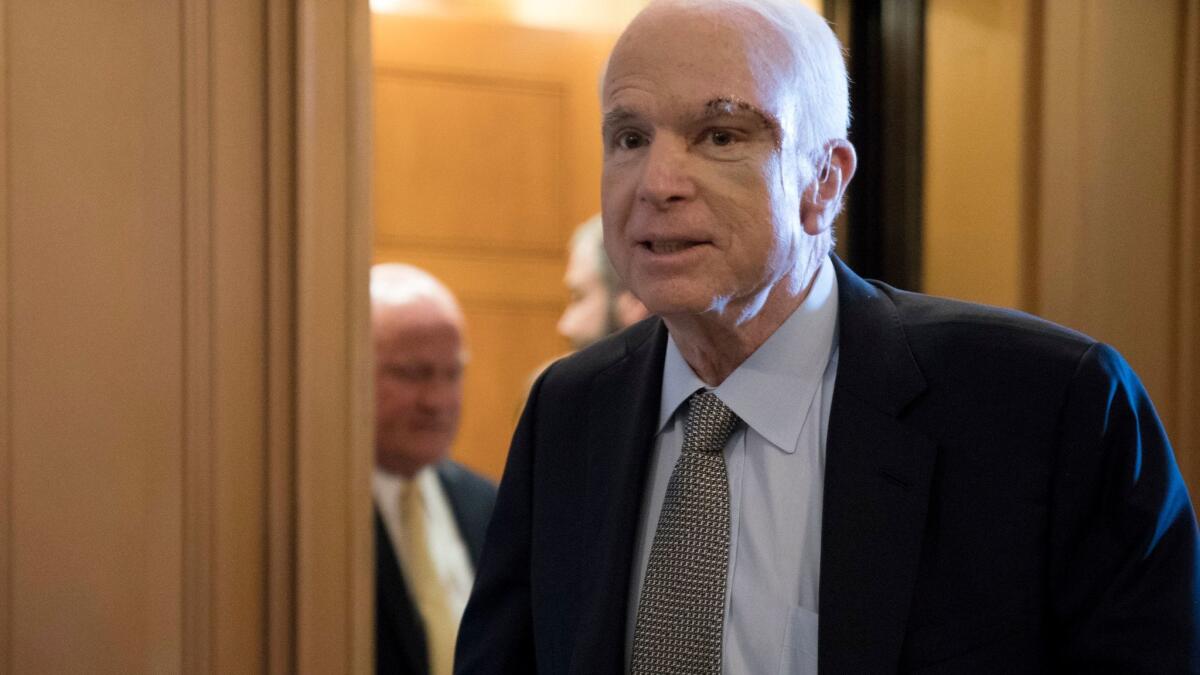Editorial: John McCain rescued the Senate GOP healthcare bill. Can he rescue the Senate?

It’s hard to ignore the irony of Sen. John McCain returning to Washington from cranial surgery at the Mayo Clinic just to keep alive a bill that would make health insurance unaffordable to millions of Americans. Had McCain (R-Ariz.) considered the symbolism of his actions more carefully, he might have lingered longer at the hospital.
But immediately after voting Tuesday to proceed to debate on the healthcare measure, McCain gave his colleagues a much-needed lecture on how badly they’ve gone astray — not just on the healthcare bill, but on legislating in general. Noting that the Senate has often been called the world’s greatest deliberative body, McCain said, “I’m not sure we can claim that distinction with a straight face today.”
No, they most definitely cannot.
The path the Senate took to reach this point — private negotiations by Republicans to develop legislation affecting one sixth of the U.S. economy, never bothering to hold hearings, let alone negotiating with Democrats — is shameful. So is the path that Senate Majority Leader Mitch McConnell (R-Ky.) is leading them down now, as they fast-track a bill they haven’t seen and devote no more than a few minutes of debate to a series of major amendments regarding health insurance cost and availability.
The goal here should be to make insurance more available and affordable, not push it out of reach of those with preexisting conditions or little income.
McCain has been called a maverick for his willingness to stray from GOP orthodoxy. But on Tuesday he sounded like a traditionalist, excoriating the Senate for abandoning the painstaking, cautious processes that are the hallmark of good legislating in favor of procedural shortcuts and winning at any cost.
Although he’d just voted to let debate begin on McConnell’s mystery healthcare bill, McCain nevertheless called it “a shell” that he couldn’t support in its current form, the product of an indefensible process. “We’ve tried to do this by coming up with a proposal behind closed doors in consultation with the administration, then springing it on skeptical members, trying to convince them it’s better than nothing, asking us to swallow our doubts and force it past a unified opposition. I don’t think that is going to work in the end. And it probably shouldn’t.”
No, it most definitely should not.
What the Senate ought to do on healthcare, he said, is what it has traditionally done, but has abandoned in its hyperpartisan dysfunction: Hold hearings. Take ideas from both sides. Bring a bill to the floor and try to “pass something that will be imperfect, full of compromises, and not very pleasing to implacable partisans on either side, but that might provide workable solutions to problems Americans are struggling with today.”
One other requirement that McCain should have included, but did not: Whatever the Senate does, it should make things better for as many Americans as possible. The Affordable Care Act has flaws, but they can be fixed. Like the House-passed healthcare bill, the Senate GOP’s proposal has problems that are far more fundamental, and they cannot be remedied. The goal here should be to make insurance more available and affordable, not push it out of reach of those with preexisting conditions or little income.
To his credit, McCain didn’t limit his critique to the healthcare legislation, but addressed the day-in, day-out operations of today’s Senate. Debates are “more partisan and more tribal more of the time than any other time I remember,” McCain said, and that’s demonstrable, as is the fact that the Senate and Congress as a whole are getting less done. Those conditions didn’t emerge overnight, and like most of the problems afflicting the Senate, they aren’t attributable exclusively to one party or the other. Instead, there has been steadily escalating unilateralism and obstruction, a destructive cycle that no one seems to able (or eager) to stop.
The answer, as McCain so eloquently put it, is to accept incremental progress built around bipartisan compromises — the best that can be expected in a country “as diverse and quarrelsome and free” as the United States. “Considering the injustice and cruelties inflicted by autocratic governments, and how corruptible human nature can be, the problem-solving our system does make possible, the fitful progress it produces, and the liberty and justice it preserves, is a magnificent achievement,” he added.
Senators badly need to find their way back to that place. They also need to take to heart McCain’s reminder that they are — collectively — an important check on presidential power. “Whether or not we are of the same party, we are not the president’s subordinates. We are his equal,” McCain intoned. It’s time they started behaving that way.
Follow the Opinion section on Twitter @latimesopinionand Facebook.
More to Read
A cure for the common opinion
Get thought-provoking perspectives with our weekly newsletter.
You may occasionally receive promotional content from the Los Angeles Times.










